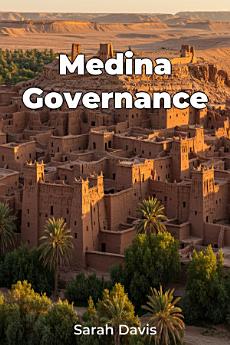Medina Governance
Sarah Davis · AI
Mar 2025 · Publifye AS
Ebook
63
Pages
family_home
Eligible
info
reportRatings and reviews aren’t verified Learn More
About this ebook
Medina Governance explores the pivotal role of Medina in early Islamic history, examining its transformation into a religious and political center under the Prophet Muhammad and the Rashidun Caliphate.
The book delves into the governance models established during this period, revealing how religious principles were adapted to the practical realities of statecraft.
One intriguing aspect is the Constitution of Medina, which demonstrates an early attempt to create a pluralistic society by outlining the rights and responsibilities of different religious communities.
The book highlights how Medina's early leaders navigated the complexities of blending religious authority with tribal customs, laying the foundation for Islamic leadership and legal frameworks that influence Islamic political thought today.
The book delves into the governance models established during this period, revealing how religious principles were adapted to the practical realities of statecraft.
One intriguing aspect is the Constitution of Medina, which demonstrates an early attempt to create a pluralistic society by outlining the rights and responsibilities of different religious communities.
The book highlights how Medina's early leaders navigated the complexities of blending religious authority with tribal customs, laying the foundation for Islamic leadership and legal frameworks that influence Islamic political thought today.
The book argues that Medina's governance was not purely theocratic but rather a pragmatic response to the socio-political conditions of the time.
It traces the evolution of Medina's governance across four sections, from pre-Islamic tribal structures and the Hijra to the establishment of key institutions and the governance styles of the Rashidun Caliphate.
By analyzing primary sources and engaging with interdisciplinary scholarship, Medina Governance offers a unique perspective on the dynamic interplay between faith and practical administration in the formative years of Islam, challenging simplistic notions and providing a grounded understanding of early Islamic governance.
Rate this ebook
Tell us what you think.
Reading information
Smartphones and tablets
Install the Google Play Books app for Android and iPad/iPhone. It syncs automatically with your account and allows you to read online or offline wherever you are.
Laptops and computers
You can listen to audiobooks purchased on Google Play using your computer's web browser.
eReaders and other devices
To read on e-ink devices like Kobo eReaders, you'll need to download a file and transfer it to your device. Follow the detailed Help Center instructions to transfer the files to supported eReaders.








